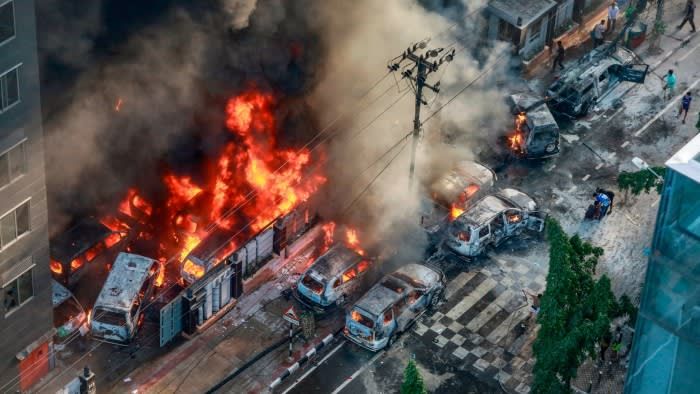Over two dozen dead in Bangladesh unrest as protests spread

Access the Editor's Digest at no cost
Roula Khalaf, the person in charge of the FT, picks out the stories she likes best for this weekly newsletter.
Over twenty-five individuals have lost their lives in Bangladesh due to a series of student demonstrations focused on employment opportunities. These protests have highlighted the widespread anger towards Sheikh Hasina's autocratic regime and the significant financial struggles in a country known for its large garment industry.
College students in a country with a population of 170 million have been protesting for weeks to abolish a controversial government policy that they believe only benefits supporters of the ruling Awami League party led by Sheikh Hasina. This policy has come to represent the corruption that has thrived during her twenty-year tenure.
According to a report from the French news agency AFP, a minimum of 39 individuals have lost their lives in the recent turmoil. Local hospitals have confirmed this number, with about two-thirds of those killed being shot by police using weapons such as rubber bullets. However, other news outlets and local media have reported a lower death toll, estimating it to be between 24 and 28 people.
Officials have shut down colleges and restricted access to the internet nationwide, while there are also reported disruptions to mobile networks. The Financial Times experienced difficulties reaching contacts in Bangladesh on Friday morning.
Students claim they have been attacked by supporters of the Awami League and law enforcement officers, while officials accuse protesters of causing damage, such as setting fire to the headquarters of the state broadcaster BTV on Thursday.
Volker Türk, who works for the United Nations as a human rights commissioner, is asking the government to talk to the demonstrators. He said on X that any violence or use of force that leads to loss of life needs to be looked into, and those responsible should be punished. Prime Minister Sheikh Hasina spoke out against the deaths, and her government has expressed a willingness to have discussions with the students. However, the protesters have not accepted this offer, believing it to be insincere.
The allocation system, which was paused in 2018 and recently brought back by a court ruling, sets aside approximately one-third of government positions for individuals who are descendants of veterans from Bangladesh's independence war in 1971 against Pakistan. Opponents argue that the system is created to favor supporters of the Awami League, which presents itself as the sole rightful successor of the independence struggle.
Sheikh Hasina, who has been in power for a long time as a female leader, won her fifth term in January. However, there were issues with the election, such as unfair treatment towards her political opponents by the police. The Bangladesh Nationalist Party, her main competition, organized a strike in Dhaka to support the students.
The frustration with the quota system in Bangladesh shows that there are not enough chances for people to succeed, even though the country has seen fast economic development. Bangladesh used to be one of the poorest countries in the world, but now it is a central location for major international brands like H&M and Zara. The country's GDP per capita is now even higher than India's.
However, the economy has faced a severe slowdown since the Covid-19 pandemic, with high inflation, power outages, and decreasing foreign reserves causing discontent with Sheikh Hasina's authoritarian leadership.
The government has received strong backing from nearby India and China, who view her commitment to secularism as a defense against Islamic extremism in the area. However, relations with the US and Europe have been tense due to her close relationship with Beijing.
This week, the US state department stated that they are keeping a close watch on the protests and expressed strong disapproval of any violence towards peaceful demonstrators.
A legal dispute regarding the quota system is on its way to the highest court in the country.

































































